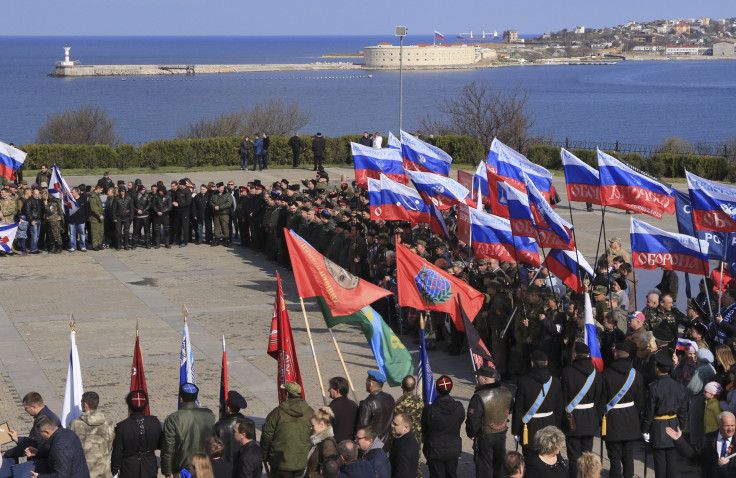Why EU Extended Russia Sanctions On Crimea Imports By One Year

Foreign ministers for European Union (EU) member states extended sanctions against Crimea, which were due to expire this Friday, by one year. The EU Council announced Monday the extension of "restrictive measures" until June 23, 2018 in response to the illegal annexation of Crimea and Sevastopol by Russia.
The sanctions were adopted in 2014 and have since been extended on a yearly basis. "As stated in the declaration by the High Representative for Foreign Affairs and Security Policy on behalf of the EU on 17 March 2017, the EU continues to condemn the illegal annexation of Crimea and Sevastopol by the Russian Federation and remains committed to fully implement its non-recognition policy," a press release on the website of European Council stated.
Read: Putin Will Never Return Crimea Despite Trump Hopes, Moscow Senator Says
The EU condemned the annexation of the Autonomous Republic of Crimea and the city of Sevastopol three years ago by the Russian Federation and the Council "remains firmly committed to Ukraine's sovereignty and territorial integrity," according to the declaration by Federica Mogherini, the High Representative of the EU for Foreign Affairs and Security Policy.
The EU reiterated it did not recognize and continued to "condemn this violation of international law. It remains a direct challenge to international security, with grave implications for the international legal order that protects the unity and sovereignty of all States."
The measures include an EU-wide ban on imports of products originating in Crimea or Sevastopol. No European or EU-based companies can buy real estate or entities in Crimea, finance Crimean companies or supply related services, nor tourism services in Crimea or Sevastopol, among other measures.
The EU, which has been imposing sanctions on Crimean products in response to the annexation of Crimea and what has been described as the deliberate destabilization of Ukraine, had decided not to hold regular bilateral summits with Russia in 2014. Among other restrictions, bilateral talks with Russia on visa matters as well as on the New Agreement between the EU and Russia were also suspended, according to the website of European Council.
The 40th G8 summit was due to be held in Russia in 2014 from June 4 to June 5 at Black Sea resort in Sochi however, the other seven countries decided on March 24 that year a summit would be held without Russia, in Brussels, Belgium. Since then, meetings have continued within the G7 process.
Read: Fast Facts To Know About Crimea, The Territory Russia Annexed From Ukraine
The EU countries also supported the suspension of negotiations over Russia's joining the Organization for Economic Co-operation and Development and the International Energy Agency.
Since Russia's annexation of Crimea in March 2014, the U.S. and EU imposed sanctions against Russia several times affecting the Russian economy. Russian banks and the ability of Gazprom — a Russian company in the business of extraction, production, transport, and sale of natural gas — to secure long term funding in U.S. dollars were also blocked. The U.S. and EU also banned exports of services and technology to Russian state oil firms engaged in the Arctic and deep-water and unconventional oil and gas exploration and production, according to reports.
In April 2016, independent Russian energy companies Lukoil and Novatek , told attendees at the annual IHS CERAWeek energy conference in Houston that they were feeling the burden of the sanctions. "We feel the impact of sanctions, but we need some time for Russia and the industry to adjust," Forbes reported citing Lukoil CEO and founder Vagit Alekperov.
© Copyright IBTimes 2024. All rights reserved.






















